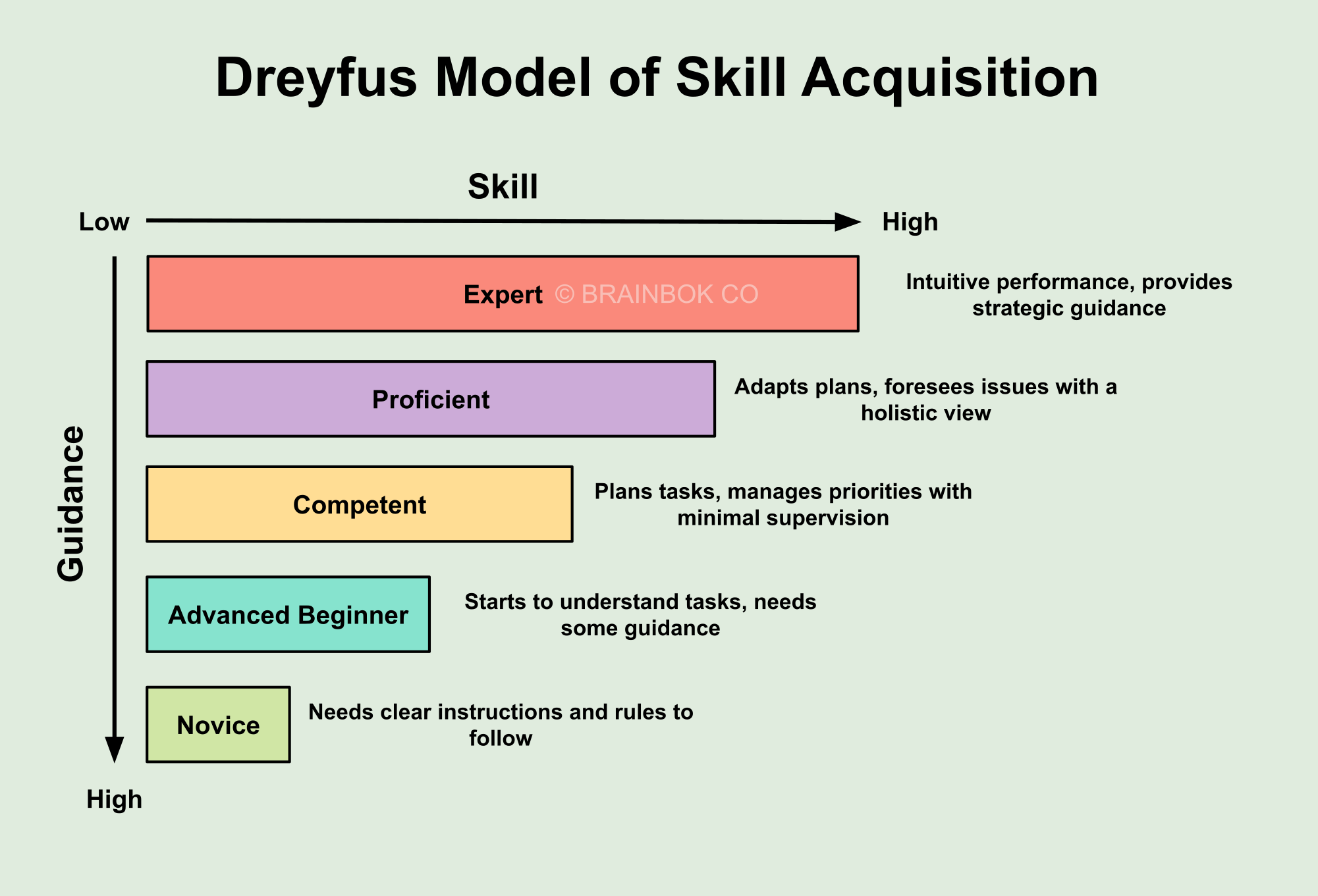Introduction
The Dreyfus Model of Skill Acquisition is a framework that outlines the stages individuals go through as they acquire skills. Developed by brothers Stuart and Hubert Dreyfus in the early 1980s, this model describes how learners progress through five distinct levels of proficiency, from novice to expert.

Summary in Project Team Context
The following table outlines the five stages of skill acquisition according to the Dreyfus model, focusing on the specific characteristics and roles of team members within a project team context.
| Stage | Description | Characteristics |
|---|---|---|
| Novice | Team member with little to no project experience who needs clear instructions and rules to follow. | • Requires detailed instructions and supervision • Limited understanding of project goals and processes • Reliant on rules and procedures |
| Advanced Beginner | Team member who starts to recognize project elements and can follow guidelines with some support. | • Begins to recognize recurring project elements • Can handle simple tasks independently • Needs some guidance for complex tasks |
| Competent | Team member who develops planning skills and can manage tasks and priorities effectively. | • Capable of creating and following project plans • Can make decisions based on project priorities • Needs minimal supervision |
| Proficient | Team member with a holistic view of the project, adapting plans as necessary and foreseeing issues. | • Understands the project as a whole • Anticipates potential problems • Modifies plans based on changing project dynamics |
| Expert | Team member with deep expertise, who performs tasks intuitively and guides the team effortlessly. | • Provides strategic vision and guidance • Intuitively grasps complex project situations • Leads the team with minimal need for detailed plans |
Application in Project Management
Project managers can apply the Dreyfus Model of Skill Acquisition to effectively assign tasks and provide appropriate support, optimizing productivity and skill development within project teams.
- Assess Skill Levels
- Evaluate team members’ skills through assessments and performance reviews.
- Tailor Training and Support
- Novice: Provide clear, step-by-step instructions and basic training.
- Advanced Beginner: Use situational examples and some guidance.
- Competent: Focus on developing problem-solving skills and independent decision-making.
- Proficient: Offer advanced training and opportunities to learn from past experience.
- Expert: Leverage their expertise for complex problem-solving and provide opportunities to mentor others.
- Optimize Task Assignment
- Novice: Assign routine, well-defined tasks with clear instructions.
- Advanced Beginner: Assign tasks that are slightly more complex but still have clear guidelines.
- Competent: Delegate tasks requiring planning, troubleshooting, and independent decision-making.
- Proficient: Allocate complex tasks requiring a holistic understanding and prioritization.
- Expert: Engage them in the most challenging aspects of the project, such as solving critical issues, and leveraging their deep expertise.
- Facilitate Mentorship and Collaboration
- Pairing: Pair novices with proficient or expert members for guidance.
- Teamwork: Encourage collaboration across different skill levels to promote learning and skill sharing.
- Plan Resources
- Use skill level information to allocate resources accurately, ensuring tasks are matched to capabilities.
- Mitigate Risks
- Identify and address skill gaps that could pose risks to project success with additional training or support.
- Provide Targeted Feedback
- Provide feedback specific to each team member’s skill level to guide their development.